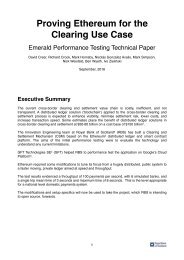Bitcoin and Cryptocurrency Technologies
1Qqc4BN
1Qqc4BN
Create successful ePaper yourself
Turn your PDF publications into a flip-book with our unique Google optimized e-Paper software.
“Tails”. When the coin l<strong>and</strong>s, they both immediately have a clear underst<strong>and</strong>ing of who won the bet,<br />
<strong>and</strong> they both have assurance that the outcome was r<strong>and</strong>om <strong>and</strong> that neither of them was able to<br />
influence the outcome.<br />
The sequence of steps in this ceremony as well as the physics of coin flipping play a crucial role in<br />
convincing both parties that the game is fair. One shortcoming of this scheme is that both parties<br />
have to be present at the same place at the same time. Also, both parties still have to trust that<br />
whoever loses will pay up. In the online world, we’d like to be able to have a lottery that is just as<br />
“fair”, but also solves the problem of making sure the loser pays.<br />
At first this might seem like a rather peculiar <strong>and</strong> limited application to be studying in detail.<br />
Amusingly, <strong>Bitcoin</strong>‐based betting services such as Satoshi Dice — which rely on a trusted party, unlike<br />
the system we’d like to design — have proven very popular, at times representing a large fraction of<br />
all <strong>Bitcoin</strong> transactions on the network.<br />
The real reason we want to study cryptographic coin flipping, however, is that it turns out that if we<br />
can design a secure protocol for it, we can use those techniques to build many other interesting <strong>and</strong><br />
useful protocols. Cryptographers study “secure multiparty computation” where two or more mutually<br />
untrusting parties each have some data <strong>and</strong> want to compute a result that depends on all of their<br />
data, but without revealing the data to each other. Think of a sealed‐bid auction, but without a<br />
trusted auctioneer. Often, these computations need to be r<strong>and</strong>omized, say, to break ties. Finally, we<br />
might want the result of the computationto determine a monetaryoutcome in an irrevocable way.<br />
Maybe we want to ensure that the winning bidder in the auction pays the seller; perhaps we even<br />
want to ensure that the seller’s (smart) property being auctioned is automatically transferred to the<br />
winning bidder. Alternatively, maybe we want to penalize parties if they deviate from the protocol.<br />
In other words, a secure multi‐party lottery is a simple setting in which to study an extraordinarily<br />
powerful paradigm: mutually untrusting participants with sensitive inputs jointly executing a program<br />
that has the power to manipulate not only bits, but also money.<br />
Coin Flipping Online. The first challenge is replacing the “coin flip” mechanism with some online<br />
equivalent. Let’s say we now have three parties, Alice, Bob, <strong>and</strong> Carol, who all want to select a<br />
number 1, 2, or 3 with equal probability. Here’s one attempt at such a protocol. Each of them picks a<br />
large r<strong>and</strong>om number — Alice chooses x, Bob y, <strong>and</strong> Carol Z. They tell each other their numbers, <strong>and</strong><br />
they compute the output as (x + y + z) % 3.<br />
If all of them chose their r<strong>and</strong>om numbers independently, this would indeed work. But remember<br />
that we’re doing this over the internet, <strong>and</strong> there’s no way to insist that they all send their numbers<br />
“simultaneously”. Alice might wait until she hears Bob’s <strong>and</strong> Carol’s numbers before broadcasting<br />
hers. If she does this, you can see how it’s trivial for her to make the final output whatever she wants.<br />
We can’t design the protocol to convince every party that none of the other parties cheated.<br />
248









